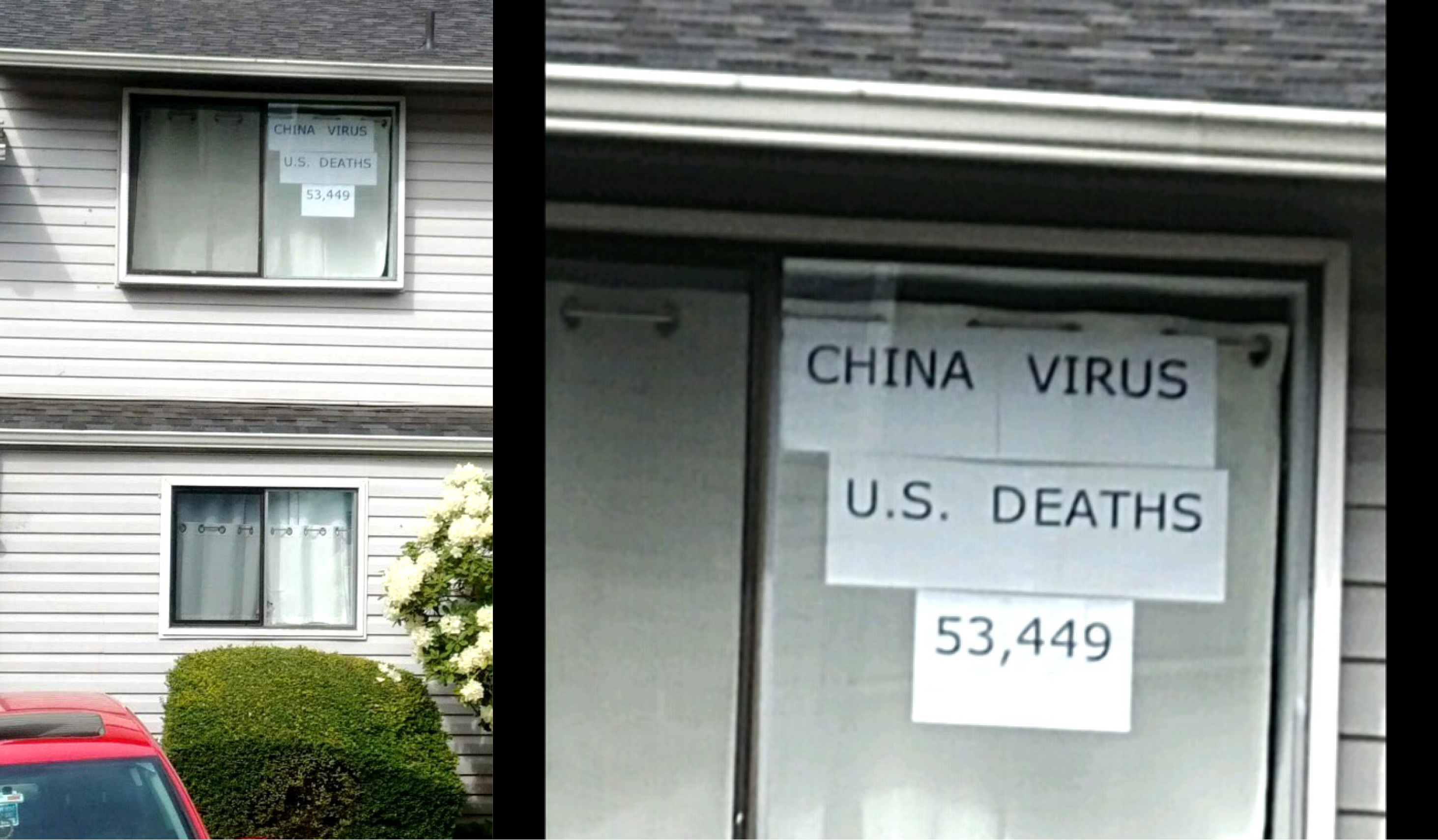By Jason Cruz
Northwest Asian Weekly

A resident in Bellevue posted a racist sign in her home. (Photo provided by Melvin Chong)
Asian Americans and Pacific Islanders (AAPI) across the nation are experiencing a rise in hate crimes as a result of the coronavirus.
Some of the stories of anti-Asian American hate are rude interactions in passing. Others gave rise to violence. Some Asian Americans have taken to purchasing weapons or refusing to go out in public, out of fear of being harassed or even assaulted.
“This is the response to a climate that ignores rational and civilized thinking with what some consider the need for survival and protection,” said Willon Lew, a board member of the Seattle chapter of the Organization of Chinese Americans (OCA).
Lew has gone out in the community to talk to service workers and others that work with the public. He notes that an angry customer returned a half-eaten meal at an Ezell’s Chicken and told the counter person, who was Chinese, they demanded a refund because “they (referring to Asians) don’t know how to make chicken.” The Ezell’s franchise is owned by Chinese Americans. Seeing that the customer was attempting to escalate the confrontation, the worker refunds the money. In another incident, a Filipino QFC employee in Renton was sneered at and avoided by a customer who claimed the worker had COVID-19.
According to the Asian Policy & Planning Council, a coalition of community-based organizations advocating for the rights of the AAPI community, it received almost 1,500 reports of coronavirus discrimination across the country in the first four weeks of implementing its reporting.
The Trump administration’s initial description of COVID-19 as the “China virus” and others seeking to find a scapegoat, labeling it as the “Wuhan virus,” have lashed out at AAPIs in the United States. The pandemic has shut down much of the United States with local governments issuing stay-at-home or shelter-in-place orders to slow down the pace of the virus spreading. COVID-19 originated in China and based on this, some Americans have directed their anger to AAPIs they deemed caused the problem.
In one of the most high-profile incidents of violence against AAPIs, a Brooklyn woman was attacked outside her home and had acid thrown on her. She suffered second degree burns across her face and body. In March, a Manhattan woman was walking across the street when she was spit on and had a part of her hair torn out after a person assaulted her. The attacker screamed at the 34-year-old woman, “You’re the reason why coronavirus is here!” Also, in Harlem, New York, a 13-year-old boy kicked a 59-year-old Asian American in the back and told the man to go back to China.
“F— Chinese coronavirus,” he told the man as he spat in his face. The man had physical injuries to his hands and knees, but refused medical attention.
Closer to home, a Northwest Asian Weekly reader emailed us about his neighbor in Bellevue who posted a racist sign on her window facing the street. Melvin Chong said he called Bellevue Police and was told there was nothing they could do as that neighbor was exercising her freedom of speech.
“It is very depressing that this country has degraded into such a state,” Chong said.
Also, Seattle Police investigated an incident on March 10 when a husband, wife, and their 8-year-old were walking past a house in a neighborhood in South Seattle when people within the home started to yell racial slurs and “coronavirus” at the family who were Asian. According to the investigation, the individuals in the house denied yelling at the family.
Not every incident is registered by local authorities, but officials would like to know of any issues that may occur, especially at this unprecedented time.
“As we confront the grim realities COVID-19 is inflicting on our communities, there is no place for hate and misplaced blame. I am disturbed to hear reports of hate speech, incidents of vandalism, and even some physical attacks that wrongly and illegally target members of our Asian American community,” said U.S. Attorney Brian T. Moran. “We are working with our federal and local law enforcement partners to investigate, and if possible, prosecute these crimes. I urge those who witness or are victims to acts of hate to contact law enforcement. All of us need to stand together to say this hateful conduct is wrong and will not be tolerated.”
“I’ve one observation on the approach to raising awareness about the bias incidents and hate crimes affecting the AAPI communities,” said Sor Knight of the U.S. Department of Justice (DOJ). “In countries like Italy and Germany, the federal and local governments in cooperation with their respective police jurisdictions, developed a national campaign to spread a unified message that the enemy is the virus, not the person…not the restrictive laws.”
Knight, a conciliation specialist with the DOJ added that there is not a coordinated effort on a national level to raise awareness. According to Knight, this leaves the AAPI community in fear, not only for their health and wellbeing, but for personal safety.
OCA has issued guidelines in reporting hate incidents. Notably, if reporting to the police, there will be an interpreter available if necessary. Consult an attorney if immigration status may come into play. It is also important to advise police that the crime was bias motivated. If a police statement is made, review it before signing for approval.
If you believe that you have been the victim of a hate crime, report it to local law enforcement. In addition, here are other resources:
U.S. Attorney’s Office, Western District of Washington, Civil Rights complaints website:
justice.gov/usao-wdwa/civil-rights
FBI, Seattle Field Division: (206) 622-0460; FBI Hate Crimes website and tip line:
fbi.gov/investigate/civil-rights/hate-crimes
fbi.gov/tips
To request a copy of the OCA guidelines, visit ocaseattle.org.
Jason can be reached at info@nwasianweekly.com.



